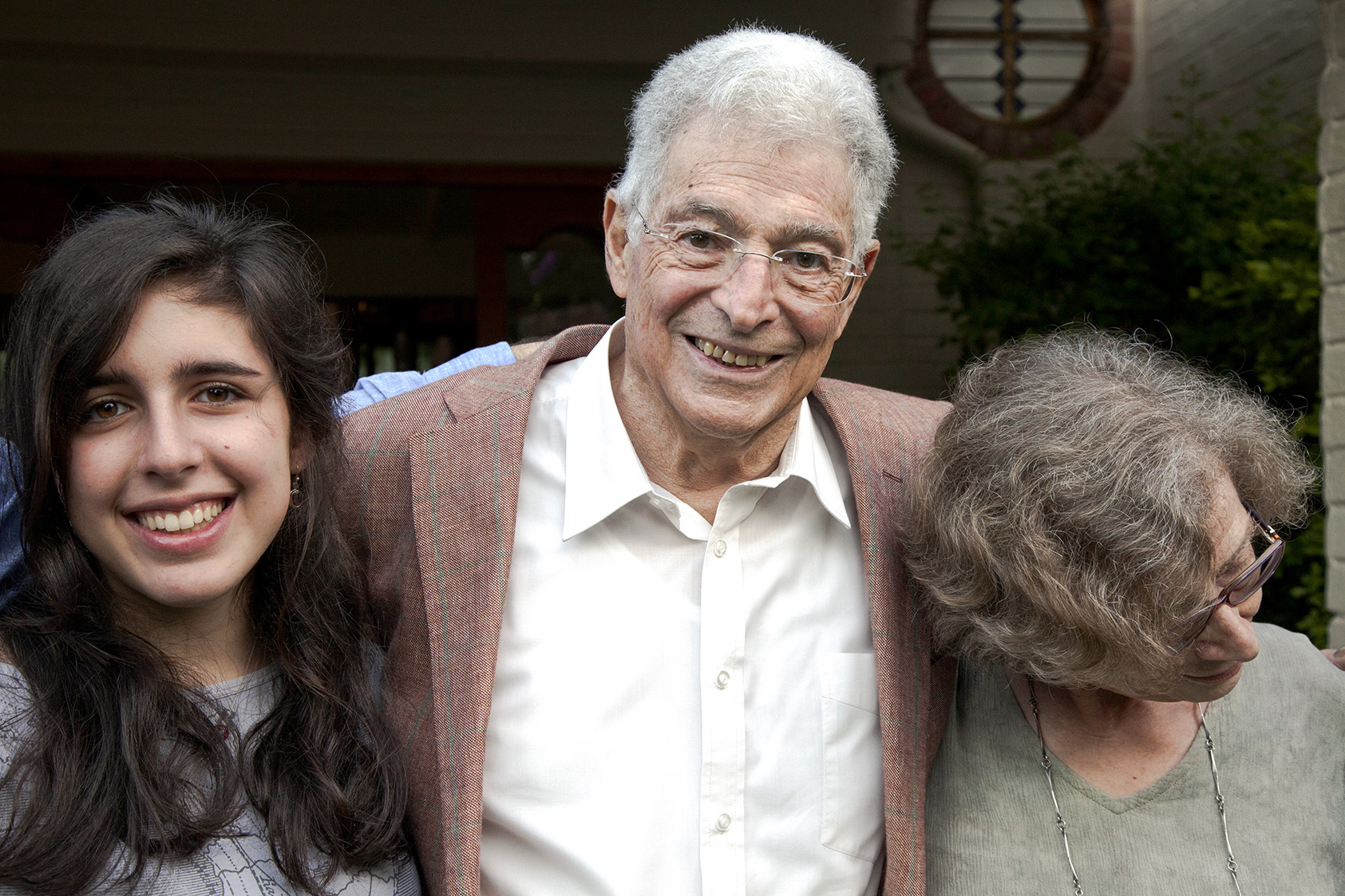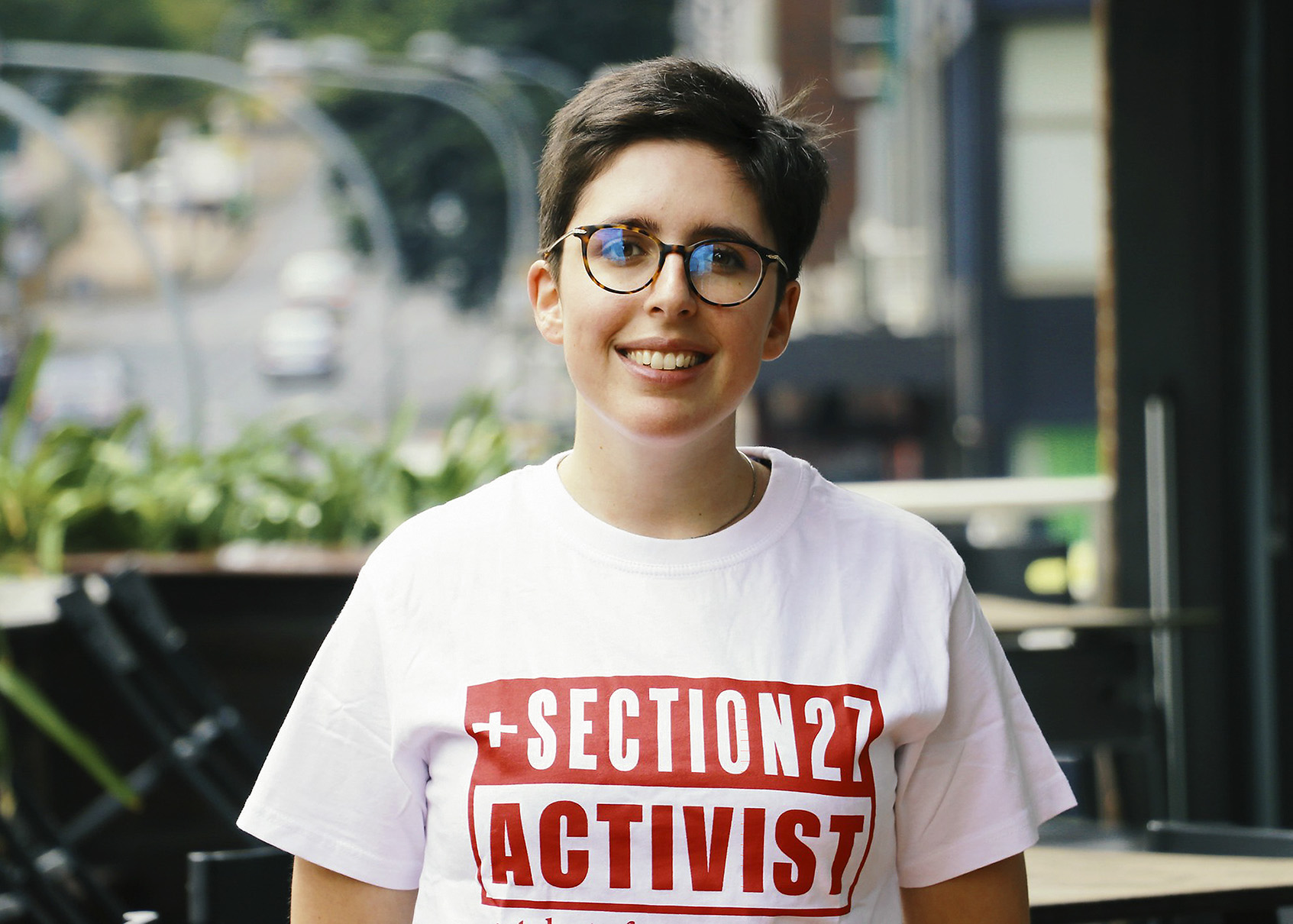Archives and Heritage
Finding Arth in the archives: Lessons learnt from former chief justice Arthur Chaskalson

Digging through dusty archives to research the life of her grandfather – the country’s first Constitutional Court chief justice – brought to life for Julia Lazar Chaskalson the very public and extraordinary legal career of the man she knew as ‘Arth’.
When I was young, my grandmother would pick me up from school and we would spend the afternoon together. Sometimes she would take me to my grandfather’s work, and he would finish up what he was doing and come home with us.
I remember my grandfather’s office as a large room, with three of its walls lined with bookshelves from floor to ceiling. At the age of eight, I would crane my neck to see the top shelves, wondering how anyone reached the books up there and what stories they could possibly tell.

Julia Chaskalson with her grandparents, Arthur and Lorraine Chaskalson, in 2012. This was a few months before Arthur died. Julia was about 17 at the time. (Photo: Eddie Wes)
Based on the air of respect which surrounded my grandfather at work, I had a vague sense that he was an important person, but I didn’t really understand what he did. In the event that he was still busy when we arrived, my grandmother would walk me around the corridors of a light, airy building and tell me stories about the art that hung on its walls.
It was not until later that I learnt about the contribution my grandparents, and in particular my grandfather, Arthur Chaskalson, made to South African society. He cared deeply that the Constitutional Court – the light, airy building my grandmother would walk me around – be accessible to all, even young children.
When I was 16 and a member of the Johannesburg junior council, I helped organise a march to the court to commemorate the June 16 uprising of 1976. Arth, as we called him, helped me coordinate logistics, and attended the march. Several hundred high school learners danced and sang in the courtyard of the Old Fort that day, and I remember my grandfather smiling at the sight.
Arthur was also highly invested in making sure that the Constitution itself be made accessible and meaningful to all. Years later, after he had passed away, I was given the opportunity to work for the Constitution Hill Trust as a historical researcher.
A primary aim of one of its new projects, the planned Museum and Archive of the Constitution at the Hill (MARCH) was to make the history of the Constitution more accessible, and to share the long story of how it came to be. This felt like work Arthur would have been supportive of. I wish he was still around today to see the launch of its interactive website, which I think tells South Africa’s legal history truthfully, sensitively and comprehensively.
My work with the team at MARCH took me to a number of different archives around the country, and once again I was invited to crane my head up to far-off shelves and question what stories could possibly be housed there – except this time I was given the privilege to read and catalogue them.
I learnt that even in the dreariest, dustiest archival room, archives are full of life. The presence of the people whose collections you work through is often palpable. Voices captured on cassette tapes or in handwritten notes and letters, and aged photographs, impress upon you the weight of memory and bring to life the humanity of historical events you could only have learnt about in a textbook.
After my grandfather passed away, I had many questions about him. To our family, he was just our grandfather – a quiet, thoughtful person who was partial to pistachios. Recollections of Arth in the domestic, quotidian sphere outnumber my memories of Arth at court.

Julia Lazar Chaskalson. (Photo: Rapelang Ntamu)
Arth was the man who would bring me porridge on a tray in bed when I slept over at their house, and who invited me to feed the cats with him. He bought me my first pair of soccer boots when I was 13. While ordinary, these memories are very special to me.
He very rarely spoke about his past or his work, and so the few details that I did know about him – that he had been part of the Rivonia Trial defence team, and that he was later the first chief justice of the new South Africa – were gleaned incidentally. Those were stories about Arthur, who, in my mind, sometimes felt like an entirely different man to the grandfather we called Arth.
Visiting the Historical Papers archive at the University of the Witwatersrand was a very profound experience for me because I was asked to look through Arthur’s collection and decide what might be useful to the exhibitions at MARCH. I left knowing more about my grandfather, and also more about myself.
There, I was primarily introduced to Arthur the professional. Documents included those detailing cases he took on as a human rights advocate during apartheid, including the Rivonia Trial and the African Resistance Movement, Pretoria 12 and Delmas treason trials; papers from when he co-founded the pro-bono human rights law organisation, the Legal Resources Centre, with lawyer and anti-apartheid activist Felicia Kentridge; working papers and memoranda from committees responsible for drafting and negotiating the Constitution; notes from his judgments, and speeches he gave during his time as chief justice.
Friends of mine who studied law have drily described his rulings as chief justice as wordy and complex. I held the drafts of those judgments in my hands at the archives and tried to reconcile the Arthur who wrote them with the Arth in my mind. Arthur: the fearless and unflappable legal professional who used his words (and actions) to fight for what he believed in; and Arth, the laconic but smiling man who came to our house for dinner every Friday night.
At first, faced with certificates and complex legal technical documents that Arthur had drafted, I felt ignorant. But as I spent more time there, Arth as I knew him emerged in the archive and I began to see that Arth and Arthur were not incongruous at all, but two sides of the same principled and compassionate coin.
His Form 1 report described him as a “very well behaved child” who was “unfortunately… very untidy”.
There were photographs of his home and my grandmother, and love letters they wrote to each other. I found an angry letter to the manager of a shop that had delivered Gillette shaving gel instead of shaving foam. He seemed to like writing in pencil, not pen – something I share with him.
Annotations on papers that he had edited by hand showed the questions and thoughts he was working through privately in the face of a very public and extraordinary career.
As unflappable as he was depicted as being in news clippings, his voice in notes and letters show that he wasn’t above feeling daunted. He seemed to acknowledge the real risk of the failure of the negotiation process to end apartheid that took place in the early 1990s. In 1991, in a letter to Frene Ginwala, who would become the Speaker of the National Assembly of South Africa in 1994, he wrote:
“If we are truly committed to establishing a democratic form of government, the process by which that government should be established, must also be democratic… If it does, I have great hopes for the future. But if it does not, then I foresee that the negotiating process will be long, difficult and possibly inconclusive, with grave risks for the future of our country.”
He wrote about the huge need for transformation.
He believed that “peace, progress and prosperity will only be possible if those who have been victims of apartheid are able to see that the new society differs materially from the old, and that a genuine attempt is being made to meet their basic needs for jobs, shelter, nutrition, health and education.
“It is crucial therefore that the constitutional structures of the new South Africa should not facilitate the preservation of white privilege or frustrate the ambitions of those who have fought for their freedom for so long.”
I learnt in the archive that Arth had never been a judge before 1994. The gravity of his new role was not lost on him.
“There are obvious difficulties which lie ahead. We need to restore respect for law; we need to meet the basic needs of the people of the country; and we need to bring into the process those who have not yet accepted the change,” he wrote in 1994, shortly after his appointment to the Constitutional Court. But he concluded optimistically: “The difficulties are real. But they are not beyond our reach.”
That sense of hopefulness characterised many of his writings, from the apartheid era right through to the newly democratic period. Representing anti-apartheid African Resistance Movement activist Hugh Lewin in the 1964 trial, in an antecedent to the Constitutional Court’s judgment on the case deciding whether or not the death penalty was constitutional, Arthur wrote, “In a proper case the sentence imposed for resorting to violence should be one which holds out hope to the offender, and offers him a way back into the community with which he has been at loggerheads.”
Covid-19 has demonstrated the true extent of inequality in South Africa, with already struggling healthcare and basic education systems strained to breaking point. I often feel a sense of despondency and cynicism when thinking about the scope of South Africa’s problems. Does the new South Africa “differ materially” from the old? Are the “basic needs of the people of the country” being met, 20 years on? Was my grandfather’s hope naïve?
At his retirement in 2005, Arthur remained hopeful. He scribbled notes in the margin of his retirement speech which said:
“We still have much to do in building our institutions, in addressing fervently and achieving the constitutional goal of social justice. But I have great confidence in the future. I believe we have the will and the capacity to realise the goals of our constitution.”
He acknowledged that the Constitution could only do so much – that hope and ideals could only do so much – and that it would be up to collective action to realise true social justice.
I take comfort in the fact that my grandfather had such optimism then. I think he would be very angry that the basic rights and needs of millions of people in the country remain unmet. But Arth was a practical, problem-solving man of integrity, and would not entertain pessimism, or complaining, lightly. So I think that despite the crisis we are in, Arth would measure his frustration at the continued legacies of apartheid with hope, and focus on getting good work done despite the obstacles.
Arth never imposed a path or career on his grandchildren. But he did believe that we should try our best to contribute to society. When I read a speech he delivered at a 1986 graduation ceremony, where he said, “What each of you does with his or her life is important not only to yourselves but to the whole community. I urge you not to be afraid… to use your energy and skills to help create a new and better society,” I felt a strong sense that those sentiments are as relevant now as they were then.
Working “fervently” to achieve social justice seems like a task that Arthur the professional, and Arth the grandfather, would both encourage. DM/MC
Julia Lazar Chaskalson worked as a historical researcher for MARCH between 2017 and 2019, but currently works for SECTION27 as a communications officer.



















 Become an Insider
Become an Insider
Thank you for those reflections Julia. Wonderful to read.